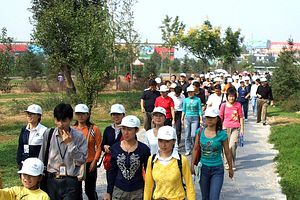China now has entered the week-long Spring Festival holiday, also known as Chinese or Lunar New Year, the most important holiday of the year for most Chinese. Nowadays, more and more Chinese people choose to spend this long holiday traveling abroad. China’s booming tourist population has already become a major tourism source for neighboring countries.
Recently, the China Tourism Academy (a research institution under the China National Tourism Administration) and Ctrip (China’s largest online travel agency) jointly issued a report on China’s tourism industry. The report estimated that 6.5 million travelers would spend this year’s Spring Festival holiday abroad, a 5.7 percent increase over the 6.15 million who traveled overseas over the same period last year.
The report also said each traveler is expected to spend 9,500 yuan (about $1,500) on average during their trips, making the tourist rush worth $9.75 billion in potential revenue for tourist destinations worldwide.
China’s neighboring countries are the most popular destinations; Thailand, Japan, Singapore, Vietnam, and Indonesia are the top five destinations.
Wealthier travelers will choose even more distant destinations. The report claimed that Chinese tourists will spend the most money in Antarctica, Argentina, Brazil, Tahiti, Norway, Tanzania, Iceland, Mexico, New Zealand, and Finland. In Antarctica, for example, each traveler on average will spend 160,000 yuan ($25,200). Despite the high expenditures, the number of travelers who booked trips to Antarctica this year have already doubled compared to last year.
Describing the tourist boom, Bloomberg said that “Chinese tourists are taking over the earth,” citing United Nations World Tourism Organization’s data revealing that “China already accounts for more than a fifth of the money spent by outbound tourists, twice as much as the next-biggest spender, the United States.”
China’s neighbors are well aware of the value of the Spring Festival tourist rush.
Thailand is expecting 300,000 tourists from China during this year’s holiday. Santi Chudintra, a deputy governor at the Tourism Authority of Thailand (TAT), said that Chinese tourists in the seven day period will “generate about 8 billion baht ($253.9 million) in revenue,”according to Reuters.
Singapore’s tourism authority announced on February 12 that China has become its largest source of tourists for the first time ever, with a total of 3.22 million Chinese tourists having visited Singapore in 2017.
To some degree, China’s growing tourism market has also become one of the Chinese authorities’ political tools. For example, when tensions between China and South Korea over the THAAD missile defense system were at their peak last year, China banned local travel agencies from selling package tours to South Korea. Even after an initial breakthrough on the dispute, the ban was still partly in place. The Chinese government’s move dealt a blow to South Korea’s tourism revenue.
In fact, China Tourism Academy’s report showed that South Korea — traditionally on of the top three destinations for Chinese tourists — has dropped out of the top ten list this year.
































